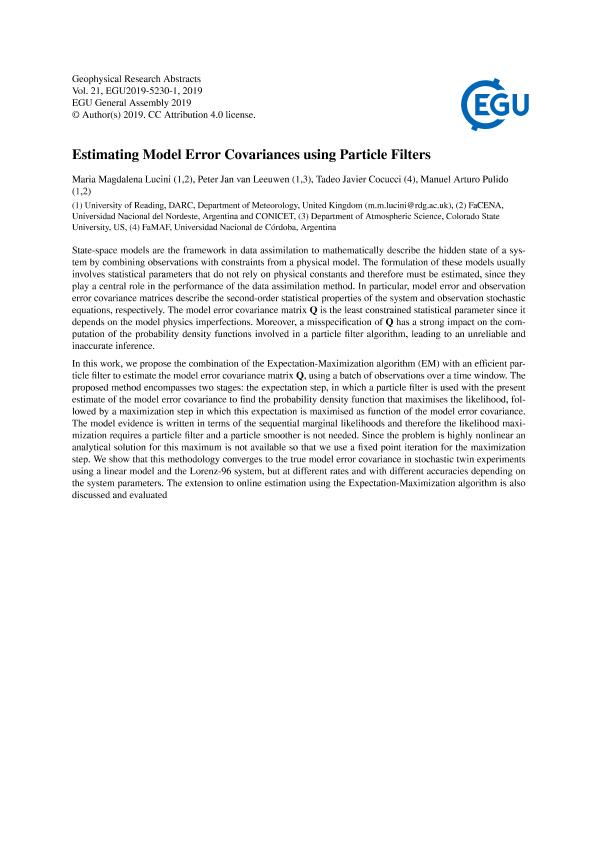Mostrar el registro sencillo del ítem
dc.contributor.author
Lucini, María Magdalena

dc.contributor.author
van Leeuwen, Peter Jan
dc.contributor.author
Cocucci, Tadeo Javier

dc.contributor.author
Pulido, Manuel Arturo

dc.date.available
2022-02-04T16:09:28Z
dc.date.issued
2019
dc.identifier.citation
Estimating model error covariances using particle filters; EGU General Assembly 2019; Viena; Austria; 2019; 1-1
dc.identifier.issn
1029-7006
dc.identifier.uri
http://hdl.handle.net/11336/151363
dc.description.abstract
State-space models are the framework in data assimilation to mathematically describe the hidden state of a system by combining observations with constraints from a physical model. The formulation of these models usually involves statistical parameters that do not rely on physical constants and therefore must be estimated, since they play a central role in the performance of the data assimilation method. In particular, model error and observation error covariance matrices describe the second-order statistical properties of the system and observation stochastic equations, respectively. The model error covariance matrix Q is the least constrained statistical parameter since it depends on the model physics imperfections. Moreover, a misspecification of Q has a strong impact on the computation of the probability density functions involved in a particle filter algorithm, leading to an unreliable and inaccurate inference. In this work, we propose the combination of the Expectation-Maximization algorithm (EM) with an efficient particle filter to estimate the model error covariance matrix Q, using a batch of observations over a time window. The proposed method encompasses two stages: the expectation step, in which a particle filter is used with the present estimate of the model error covariance to find the probability density function that maximises the likelihood, followed by a maximization step in which this expectation is maximised as function of the model error covariance. The model evidence is written in terms of the sequential marginal likelihoods and therefore the likelihood maximization requires a particle filter and a particle smoother is not needed. Since the problem is highly nonlinear an analytical solution for this maximum is not available so that we use a fixed point iteration for the maximization step. We show that this methodology converges to the true model error covariance in stochastic twin experiments using a linear model and the Lorenz-96 system, but at different rates and with different accuracies depending on the system parameters. The extension to online estimation using the Expectation-Maximization algorithm is also discussed and evaluated.
dc.format
application/pdf
dc.language.iso
eng
dc.publisher
Copernicus Publications

dc.rights
info:eu-repo/semantics/openAccess
dc.rights.uri
https://creativecommons.org/licenses/by-nc-sa/2.5/ar/
dc.subject
DATA ASSIMILATION
dc.subject
PARTICLE FILTERS
dc.subject
STATE SPACE MODEL
dc.subject
EXPECTATION-MAXIMIZATION
dc.subject.classification
Ciencias de la Información y Bioinformática

dc.subject.classification
Ciencias de la Computación e Información

dc.subject.classification
CIENCIAS NATURALES Y EXACTAS

dc.title
Estimating model error covariances using particle filters
dc.type
info:eu-repo/semantics/publishedVersion
dc.type
info:eu-repo/semantics/conferenceObject
dc.type
info:ar-repo/semantics/documento de conferencia
dc.date.updated
2022-02-02T16:08:30Z
dc.identifier.eissn
1607-7962
dc.journal.volume
21
dc.journal.number
5230
dc.journal.pagination
1-1
dc.journal.pais
Austria

dc.journal.ciudad
Viena
dc.description.fil
Fil: Lucini, María Magdalena. University of Reading; Reino Unido. Consejo Nacional de Investigaciones Científicas y Técnicas. Centro Científico Tecnológico Conicet - Nordeste; Argentina. Universidad Nacional del Nordeste. Facultad de Ciencias Exactas y Naturales y Agrimensura; Argentina
dc.description.fil
Fil: van Leeuwen, Peter Jan. University of Reading; Reino Unido
dc.description.fil
Fil: Cocucci, Tadeo Javier. Universidad Nacional de Córdoba. Facultad de Matemática, Astronomía y Física; Argentina. Consejo Nacional de Investigaciones Científicas y Técnicas. Centro Científico Tecnológico Conicet - Córdoba; Argentina
dc.description.fil
Fil: Pulido, Manuel Arturo. Consejo Nacional de Investigaciones Científicas y Técnicas. Centro Científico Tecnológico Conicet - Nordeste. Instituto de Modelado e Innovación Tecnológica. Universidad Nacional del Nordeste. Facultad de Ciencias Exactas Naturales y Agrimensura. Instituto de Modelado e Innovación Tecnológica; Argentina
dc.relation.alternativeid
info:eu-repo/semantics/altIdentifier/url/https://meetingorganizer.copernicus.org/EGU2019/EGU2019-5230-1.pdf
dc.conicet.rol
Autor

dc.conicet.rol
Autor

dc.conicet.rol
Autor

dc.conicet.rol
Autor

dc.coverage
Internacional
dc.type.subtype
Congreso
dc.description.nombreEvento
EGU General Assembly 2019
dc.date.evento
2019-04-07
dc.description.ciudadEvento
Viena
dc.description.paisEvento
Austria

dc.type.publicacion
Journal
dc.description.institucionOrganizadora
European Geosciences Union
dc.source.revista
Geophysical Research Abstracts
dc.date.eventoHasta
2019-01-12
dc.type
Congreso
Archivos asociados
